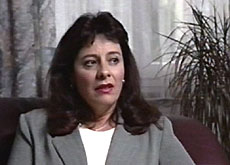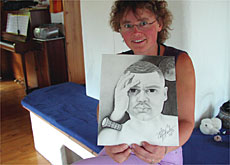Death row inmates get hope from Swiss pen pals

Lifespark, the Swiss organisation devoted to finding pen pals for death row inmates in the United States, is this year marking its tenth anniversary.
On World Day against the Death Penalty, swissinfo spoke to the women whose letters often provide men on death row with their only contact to the outside world.
Lifespark’s membership has risen from 150 to 250 in recent years, and the organisation has also become more active in campaigning for the abolition of the death penalty.
“Over the years, some of our members who had been writing letters for a long time [to death row inmates] asked that we do more in the name of Lifespark,” Evelyne Giordani, the organisation’s president, told swissinfo.
This culminated in Lifespark’s decision to hold a series of talks in 2000 on the death penalty, with American guests and in collaboration with human rights groups such as Amnesty International.
Lifespark is also involved in international campaigns seeking the abolition of the death penalty, and has provided legal assistance to inmates on death row.
However, finding pen friends is still a core component of its work – with some of the Swiss letter writers even making the journey to the US to visit the inmates.
Prison visits
“I became really good friends with my first pen pal and I visited him,” recalls Ursula Corbin, one of the Lifespark founders.
“I took it really badly when he was executed and decided I wouldn’t correspond with anyone else on death row.
“But then so many inmates heard that I had been writing to him, that they wrote me asking if I would correspond with them. I got dozens of letters.”
Instead of writing to all the men, Corbin set up Lifespark with two other Swiss women based on a similar organisation in Britain in order to find pen friends for the condemned men.
Inhumane conditions
Members of Lifespark are not only opposed to capital punishment, but also the inhumane conditions on death row, particularly in Texan prisons where the men are kept in complete isolation.
Their cells have no windows and they are only allowed as many possessions as can fit inside a small box. And the men are permitted no more than two hours of visits a week.
Corbin says it is for these reasons that they write the letters, and not necessarily because they are convinced of the innocence of the inmates.
She believes that two of the four prisoners she currently writes to are guilty of murder.
But like other Swiss pen pals, Corbin thinks that many inmates are sentenced to death, even though the evidence against them is weak at best.
She says that the letters “are their way of getting out, without getting out,” and finds time between her job and family life to devote five hours a week writing to them.
Personal relationship
Maria Eggimann, a teacher who lives with her family in a small village in the Bernese Alps, has one pen friend on death row (see related story “A portrait of a Swiss pen pal”).
“I wasn’t aware when I started writing how much impact this would have on my personal life,” explains Maria Eggimann. “[But] I found out pretty quickly that he really is somebody who has nobody.”
Both Corbin and Eggimann are travelling to the US this month to visit their pen friends on death row in Texas.
It could be the last time they see two of the men alive, since they have nearly exhausted the appeal process.
Writing against death
Swiss filmmaker, Rolf Lyssy, accompanied Corbin during one of her visits to Texas last year and made a film about the unusual correspondence.
“It’s easy to criticise other countries and systems,” Lyssy told swissinfo. “But you realise how unacceptable the death penalty is when you see what’s going on, especially how they treat prisoners in Texas.”
The film, “Writing against Death”, will be screened for the first time in the United Nations in New York later this autumn.
It is also being screened at the National Film Archives in Lausanne as part of a season of films about the death penalty.
Lyssy has decided to grant the wish of a last interview to Stephen Moody, the death row inmate shown in the film, if his final appeal is denied. He will add the footage to the end of the film.
Moody was sentenced to death for killing a man during an apparent drugs deal.
Anger
Corbin says she plans to go on corresponding with people on death row, even if Moody or any other of her pen pals is executed.
“I’m so angry inside, angry to see that such a civilised country still treats people like this – their own citizens. They’re killing their own citizens,” says Corbin.
“This anger gives me the energy to continue because nothing ever changes in this world if everybody says ‘oh, nothing can be done about it’,” she adds.
“I want to be part of a change and even if I will not see it, I hope future generations will see the change.”
swissinfo, Dale Bechtel
There are about 3,500 inmates on death row in United States prisons.
Almost a third are in California and Texas.
A disproportionate number of inmates condemned to death are black.
A study conducted by the US General Accounting Office found that in more than 80% of cases, “race influenced the likelihood of being sentenced to death”.
October 10 has been declared “World Day against the Death Penalty” by an international coalition of NGOs, bar associations, unions and local governments.

In compliance with the JTI standards
More: SWI swissinfo.ch certified by the Journalism Trust Initiative


You can find an overview of ongoing debates with our journalists here. Please join us!
If you want to start a conversation about a topic raised in this article or want to report factual errors, email us at english@swissinfo.ch.